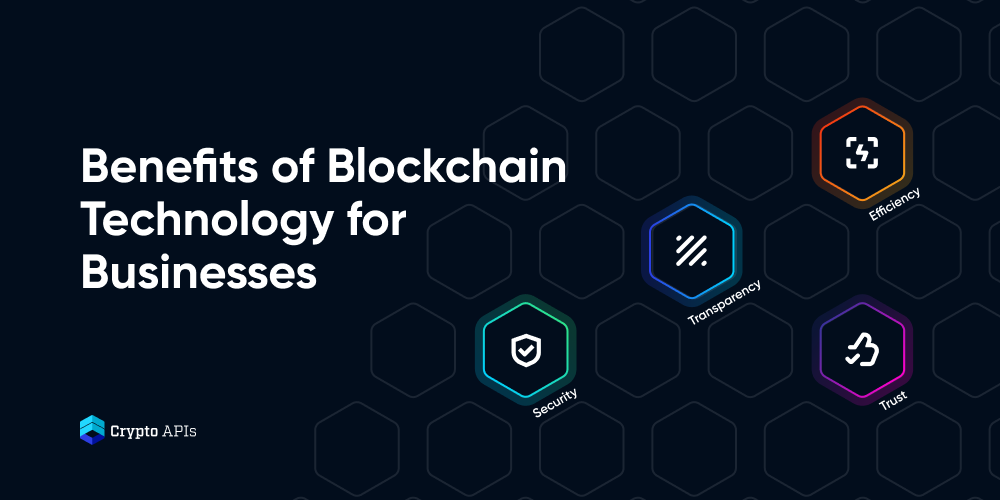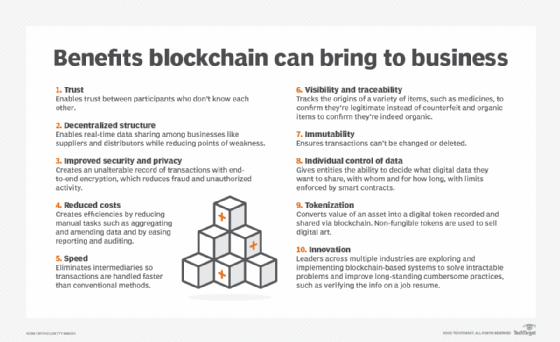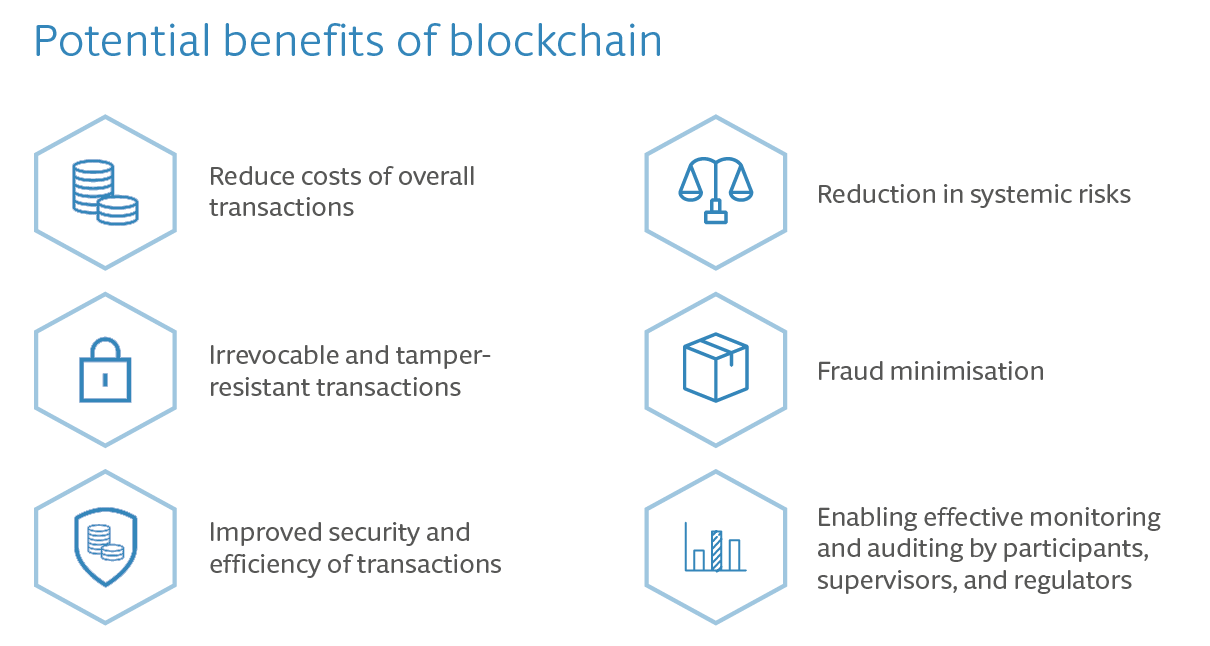What is the Benefits of Blockchain Technology
Blockchain technology offers benefits such as transparency, security, and efficiency in recording and verifying transactions. Due to its decentralized nature, it reduces the risk of fraud and eliminates the need for intermediaries, ultimately lowering transaction costs.
The technology's immutability ensures that once data is recorded, it cannot be altered, providing a high level of trust and reliability. The potential applications of blockchain span across various industries, from finance to healthcare, supply chain management, and beyond.
Its ability to create tamper-proof and permanent records has the potential to fundamentally transform how businesses and organizations operate, making processes more secure and efficient.
Blockchain technology offers numerous advantages, including enhanced security, cost reduction, and increased trust and reliability. Its decentralized nature and immutability make it a powerful tool for transforming various industries, paving the way for more efficient and secure systems.

Credit: cryptoapis.io
Transparency And Security
Blockchain technology offers unparalleled transparency and security benefits. By providing a decentralized system, blockchain ensures trust and immutability in transactions, protecting against fraud and data manipulation. This innovation revolutionizes industries by fostering openness and tamper-proof record-keeping.
Immutable And Auditable Transactions
Transparency and Security play a crucial role in the adoption of blockchain technology. Blockchain ensures that all transactions are immutable and auditable. Each transaction is recorded in a secure and unchangeable manner.Enhanced Data Security
Blockchain technology offers unparalleled security measures that safeguard data integrity. All transactions are encrypted, making it highly resistant to tampering or unauthorized modifications.
Credit: www.techtarget.com
Decentralization
Decentralization is a key benefit of blockchain technology, allowing for the removal of intermediaries and creating a more transparent and secure system. With blockchain, transactions can be verified and recorded by a decentralized network, reducing the risk of fraud and increasing trust among users.
Decentralization is a key feature of blockchain technology that sets it apart from traditional centralized systems. Unlike traditional systems where there is a central authority overseeing transactions and data, blockchain operates on a distributed ledger that is replicated across multiple computers, known as nodes. This decentralization brings several benefits, including:Removal Of Intermediaries
A significant advantage of blockchain's decentralization is the elimination of intermediaries in transactions. In traditional systems, intermediaries such as banks, brokers, or government agencies are often required to facilitate transactions, verify identities, and ensure trust between parties.Reduced Risk Of Single Point Of Failure
Another important benefit of blockchain's decentralization is the reduced risk of a single point of failure. In centralized systems, if the central authority or server fails, the entire system can come to a halt, disrupting operations and causing potential losses.
|
|---|
|
|
|
|
Cost-efficiency
When it comes to blockchain technology, one of the major benefits is its cost-efficiency. Blockchain has the potential to transform various industries by reducing costs and improving overall efficiency. Let's delve into some of the ways in which blockchain technology can bring about cost-efficiency.
Elimination Of Third-party Fees
With blockchain, transactions can occur directly between parties, eliminating the need for intermediaries such as banks or payment processors. This directly translates to lower transaction costs as there are no third-party fees involved.
By leveraging blockchain technology, businesses can save significantly on transaction fees, making it a cost-effective alternative to traditional payment methods.
Streamlined Processes
Blockchain technology enables streamlined and automated processes through smart contracts, which execute transactions automatically when predefined conditions are met. This removes the need for manual intervention, minimizing operational costs and reducing the possibility of errors.
Businesses can benefit from increased efficiency and reduced administrative expenses as a result of streamlined processes facilitated by blockchain.
Faster Transactions
Blockchain technology offers a plethora of benefits, and one of the most significant is the ability to facilitate faster transactions. The traditional financial systems often involve lengthy processes and delays, but blockchain technology has revolutionized the way transactions are conducted.
Near Instant Settlements
One of the key advantages of blockchain technology is its ability to enable near instant settlements. With traditional banking systems, transactions can take days to complete, especially for cross-border transfers.
However, blockchain technology accelerates this process, allowing for near instant settlements within minutes, regardless of the geographical location of the parties involved.
24/7 Transaction Capability
Another compelling advantage of blockchain technology is its 24/7 transaction capability. Unlike traditional financial systems that operate within specific business hours, blockchain technology empowers individuals and businesses to conduct transactions round the clock, without being confined by conventional banking hours or holidays. This ensures unparalleled convenience and accessibility for users, boosting efficiency and productivity.
Global Reach
Blockchain technology offers a global reach that transcends geographical boundaries. It enables borderless transactions and promotes financial inclusion. With its decentralized nature, blockchain technology is reshaping industries, transforming the way we conduct business, and providing numerous benefits to individuals and organizations worldwide.
Borderless Transactions
One of the key benefits of blockchain technology is the ability to facilitate borderless transactions. Traditional financial systems often involve intermediaries, such as banks, which can add complexity and increase costs.
However, blockchain eliminates the need for intermediaries by enabling direct peer-to-peer transactions, regardless of the distance between parties. In addition, blockchain technology is not regulated by any single government or entity, making it a truly global platform for conducting transactions.
This allows individuals and businesses to engage in cross-border transactions without facing the limitations and delays associated with traditional banking systems.
Furthermore, blockchain technology ensures transparency and security throughout the transaction process. Transactions recorded on the blockchain are immutable and cannot be altered or tampered with. This eliminates the risk of fraud and increases trust between parties, making cross-border transactions more efficient and secure.
Financial Inclusion
Blockchain technology plays a crucial role in promoting financial inclusion, especially in underserved regions or for individuals without access to traditional banking services. By leveraging blockchain, individuals can have direct control over their financial assets, without the need for a trusted intermediary.
In many developing countries, large portions of the population are unbanked or underbanked, meaning they lack access to basic financial services. Blockchain technology provides a decentralized and secure platform for individuals to store and manage their funds, bypassing the need for traditional banking infrastructure. This allows for greater financial inclusion, empowering individuals to participate in the global economy.
In addition, blockchain-based cryptocurrencies provide alternative means of payment and serve as a store of value, particularly for those without access to stable or reliable national currencies. These digital currencies enable financial transactions for individuals who would otherwise be excluded from formal financial systems.
Overall, the global reach of blockchain technology opens up new possibilities for individuals and organizations worldwide. From borderless transactions to financial inclusion, blockchain is revolutionizing how we transact and interact in the modern digital age.
Smart Contracts
Blockchain technology introduces smart contracts, streamlining transactions securely and efficiently without intermediaries. Benefits include transparency, automation, reduced costs, and enhanced security in various industries. Smart contracts revolutionize business operations by promoting trust and eliminating the need for third-party involvement.
Automated And Self-executing Contracts
Smart contracts revolutionize traditional contract processes by automating execution. These contracts are written in code and facilitate secure and transparent transactions.Increased Efficiency In Business Operations
Smart contracts enhance operational efficiency by eliminating intermediaries and reducing costs. They streamline workflows, improve accuracy, and enable faster transaction speeds. Blockchain technology drives the adoption of these efficient and secure smart contracts.Challenges And Future Outlook
Blockchain technology offers transparent transactions, enhanced security, and decentralized operations. Its benefits include increased efficiency and reduced costs, paving the way for a promising future in various industries. As challenges are addressed, the technology's potential for innovation and growth becomes increasingly apparent.
Blockchain technology offers numerous benefits, but it is not without its challenges and considerations for the future. Let's explore some key areas that need attention.Scalability Issues
Scalability remains a significant challenge in blockchain technology due to the increasing number of transactions.- Block size limitations can hinder transaction speed.
- Network congestion may lead to delays and higher fees.
Integration With Existing Systems
One of the critical challenges for blockchain technology is integrating it with current systems seamlessly.- Legacy systems may not easily adapt to the decentralized nature of blockchain.
- Interoperability issues can arise when connecting different blockchain networks.

Credit: www.lexology.com
Frequently Asked Questions Of What Is The Benefits Of Blockchain Technology
What Are The Main Benefits Of Blockchain Technology?
Blockchain technology offers enhanced security, transparency, decentralization, and efficient transaction processes for users.
How Does Blockchain Technology Ensure Security?
It uses cryptographic algorithms and decentralized network architecture to secure transactions, making it nearly impossible to tamper with data.
Can Blockchain Technology Help In Reducing Fraud?
Yes, blockchain's transparent and immutable nature helps in reducing fraud by making transactions traceable and secure.
What Industries Can Benefit From Blockchain Technology?
Industries like finance, healthcare, supply chain, and real estate can benefit from blockchain's secure and transparent transaction capabilities.
What Are The Long-term Advantages Of Adopting Blockchain Technology?
Beyond immediate benefits, adopting blockchain can lead to reduced costs, faster transactions, and improved trust among stakeholders.
Conclusion
To sum up, the benefits of blockchain technology are vast and varied. From enhanced security and transparency to increased efficiency and cost-effectiveness, this revolutionary technology has the potential to transform various industries.
By eliminating the need for intermediaries and creating trust through decentralized systems, blockchain opens up new opportunities for innovation and collaboration.
As businesses and individuals embrace the potential of blockchain, we can expect to witness a significant shift in how we conduct transactions and manage data.






